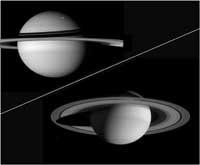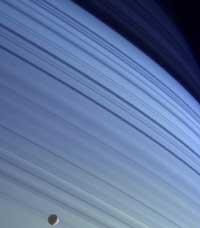Cuckoo Saturn Rings

It is a phenomenon related to the rotation of the planets, a question of views. When Saturn revolves around the Sun, from time to time, we can only see the edge of the rings from Earth. This phenomenon is known as the crossing of planes of the rings, that is, when it rotates, we go from seeing one side of the rings to seeing the other side and in that transition, at a given moment, we only see the edge. These rings, by their thinness, seem to disappear if we only see the mentioned song.
This phenomenon occurs every fifteen years and is now occurring. Gradually we will see Saturn's rings becoming thinner and disappear completely on September 4, 2009. As in eclipses, once they have completely disappeared, they begin to appear again.

First, Galileo Galilei
Galileo was the first to see this phenomenon, but he could not understand what was going on. The truth is that Galileo himself was the first to see Saturn with a telescope in 1610. He was surprised to see a triple planet instead of a circular planet. He saw that Saturn had similar ears, two bodies that were almost touching Saturn and that all moved together.
Galileo never knew that those he saw are large sets of ring shaped ice particles. These particles orbit around Saturn and are of different sizes, being the simplest microscopic grains of ice and the largest ones of a house. But
The truth is that Saturn was not very eye-catching for Galileo, so he only looked at it periodically. After several months without looking, in the autumn of 1612 he looked at him and casually found himself with a cross of planes mentioned. He was surprised, though with much attention, those bodies that he saw a year earlier disappeared from his sight, and he saw Saturn round. Desperate, he stopped looking at Saturn for a while.
Despite not seeing rings, look!

As we have already mentioned, when he passed to Galileo, he stopped looking at the rings. But once the light that the rings give has disappeared, we have a unique opportunity to see the components of Saturn that we normally cannot see as small satellites. In fact, most of the Saturn satellites that have been identified from Earth have been found at the time of the ring plane crosses.
In addition, along with the crossing of planes, we can see the blue north pole of Saturn. In 2005 they discovered that their sky looks blue, as on Earth, when the Cassini space probe passed over the northern hemisphere of Saturn. In general, the clouds of Saturn are golden, but for some reason they have become blue in high latitudes of the northern hemisphere.
Since he discovered, Cassini has only been able to observe this blue color through, because the blue layer was "hidden" behind the rings. Now the rings have been hidden and they have been able to see the phenomenon from Earth. It's not so bad, so hide the rings for a while, isn't it?
Published in 7K.
Buletina
Bidali zure helbide elektronikoa eta jaso asteroko buletina zure sarrera-ontzian











